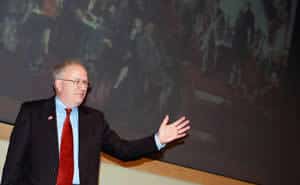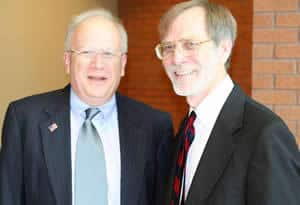UAMS Marks Constitution Day With Two Lectures
Sept. 30, 2009 | Constitution Day was twice as nice in 2009 as the University of Arkansas for Medical Sciences (UAMS) marked the occasion with back-to-back lectures on the document that has served for more than two centuries as the supreme law of the United States. The U.S. Congress, aware of the impact the U.S. Constitution has on nearly every aspect of American life, has mandated that all educational institutions in the United States that receive federal funding offer a program on the U.S. Constitution each year on U.S. Constitution day, which is Sept. 17. This was the date that delegates to the Constitutional Convention signed the document, sending it to the people of each state for ratification. J. Leon Holmes, chief judge of the Federal Eastern District, was scheduled by Jon Wolfe, Ph.D., associate dean of the UAMS College of Pharmacy, to serve as the main speaker for this year’s event. Holmes presented a thorough overview of the Constitution’s creation titled “Reflections on the Constitutional Convention of 1787” delivered to a lunchtime crowd in the main auditorium of the Wilson Education Building. “Of the 162 constitutions in the world, only 13 were written and adopted before World War II,” an emotional Holmes said. “Ours has not only endured the test of time, but made possible the greatest republic in the world.” What began as an experiment in governing a new world more than 220 years ago, Holmes said, has now become a model that is still referred to as the ultimate guide to law in the United States. “And that is absolutely remarkable,” he added. Because the featured speaker for this year’s event, Judge Holmes, could not be booked until Sept. 18, the actual day (Sept. 17) was also marked with a noontime lecture from Wolfe at the Wilson Education Building. Wolfe presented “The United States Constitution and Health Care,” which demonstrated that the founding document itself contains no direct statement about the public health or about medical practice. This is hardly surprising, he said, considering that the founders could not foreknow that health care ever include a large component of interstate commerce, an area specifically reserved for federal retulation. “Although the founders could not have conceived a nation linked by instantaneous communications and commerce carried on with automobiles and aircraft, their document persists today and regulates such commerce,” Wolfe said. “Only in the liberty clauses can we find language that suggests the role of the federal government. It is in this very capacity to stretch and to accommodate new circumstances that the Constitution demonstrates its great genius. It remains a basic law for a nation proven capable of unprecedented growth and of leadership in the world.” Over time the United States has truly become the “City Builded Upon a Hill” that the first settlers hoped to found. The Constitution has enabled the practical expression of the words of the Declaration of Independence that have made it a model for all peoples, Wolfe said. The Constitution, as Judge Holmes concluded, represents the achievement of a remarkable group of well-educated patriots determined to fashion the best document to contain the tension between the need for a strong federal government and the need to restrain how that government deals with the rights of its citizens. “It is worthy of honor by today’s Americans,” Holmes said. |

